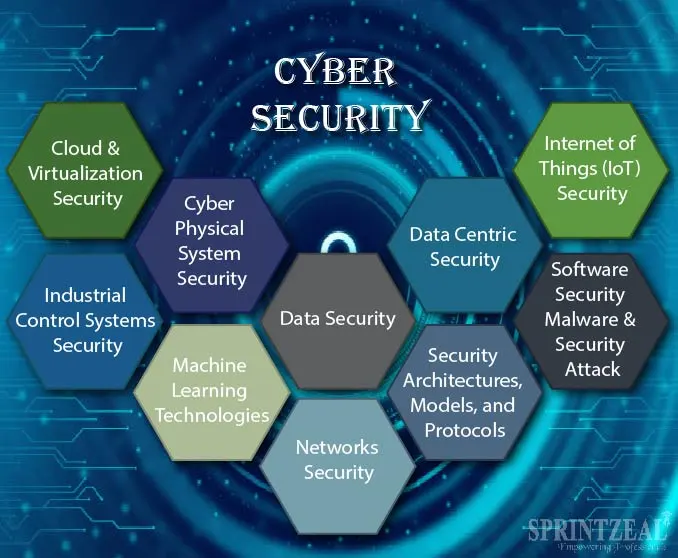
Introduction: The Growing Demand for Cybersecurity Professionals
In today’s digital world, cybersecurity has become one of the most crucial fields. With increasing cyber threats, data breaches, and the rise of remote work, organizations are placing a high priority on cybersecurity measures to protect sensitive information. As a result, there’s a significant demand for skilled cybersecurity professionals to safeguard data and infrastructure. The career prospects in cybersecurity are not only abundant but also offer a future-proof path with excellent job security and growth potential.
The Future of Cybersecurity Careers: Trends and Job Prospects
Cybersecurity careers are rapidly evolving as new threats and technological advancements emerge. According to industry projections, cybersecurity jobs are expected to grow significantly over the next decade, making it one of the fastest-growing fields. With trends like artificial intelligence, machine learning, and the Internet of Things (IoT) reshaping the industry, cybersecurity experts must adapt and stay ahead of emerging risks. As industries like healthcare, finance, and government invest heavily in cybersecurity, job prospects for those entering the field are highly promising.
Why Cybersecurity Is a Secure Career Choice
Cybersecurity offers job security like few other professions. Given the essential nature of data protection, companies cannot afford to skimp on cybersecurity. This career path is resilient even during economic downturns, as the need for cybersecurity professionals remains constant. Additionally, cybersecurity jobs offer robust growth and a stable income, making them a wise choice for anyone seeking a long-lasting career with ample opportunity for advancement.
Skills Needed for a Successful Cybersecurity Career
To excel in cybersecurity, you’ll need a unique set of skills that combines technical knowledge with problem-solving abilities. Core skills include knowledge of network security, encryption, threat analysis, and ethical hacking. Strong analytical skills are essential, as cybersecurity professionals must be able to anticipate, identify, and mitigate potential threats. Other valuable skills include familiarity with programming languages, understanding regulatory standards, and effective communication, as cybersecurity roles often involve collaborating with diverse teams.
How to Start Your Cybersecurity Career Journey
For those interested in cybersecurity, there are several entry points to consider. Many professionals begin by obtaining a degree in computer science, IT, or a related field. Certifications such as Certified Information Systems Security Professional (CISSP), CompTIA Security+, and Certified Ethical Hacker (CEH) are highly valued by employers and can help boost your career. Entry-level positions such as security analyst or IT technician provide a solid foundation, allowing you to gain hands-on experience in identifying and responding to security threats.
The Role of Certifications in Career Advancement
Certifications are critical in the cybersecurity field, as they validate your skills and knowledge. Credentials like the CISSP and CEH are widely recognized and open doors to higher-level positions. Additionally, staying updated with the latest certifications shows your commitment to professional growth and knowledge of current security trends, giving you an edge over other candidates.

Top Cybersecurity Job Roles and Opportunities
The cybersecurity industry offers a variety of job roles to suit different skill sets and interests. Common positions include:
- Security Analyst: Focuses on monitoring and protecting an organization’s network from potential threats.
- Ethical Hacker: Also known as a penetration tester, this role involves testing systems to identify and fix vulnerabilities.
- Information Security Manager: Oversees the cybersecurity strategy, implementing measures to prevent data breaches.
- Cybersecurity Consultant: Works with various companies to advise on and improve their cybersecurity protocols.
These roles not only offer diverse career options but also provide opportunities to specialize in areas such as cloud security, network defense, and incident response.
Cybersecurity Salary Insights and Earning Potential
Cybersecurity professionals often enjoy high salaries due to the specialized nature of their work and the high demand for these skills. According to industry reports, entry-level cybersecurity roles can start at around $60,000 annually, while experienced professionals and specialists can earn six-figure salaries. Job titles like Information Security Manager or Chief Information Security Officer (CISO) come with significant earning potential, often exceeding $150,000 per year. Additionally, cybersecurity roles frequently come with benefits, including flexible working conditions, bonuses, and career development support.
Conclusion: Cybersecurity – A Career Path with Endless Opportunities
As technology continues to advance, so will the demand for cybersecurity expertise. This field offers not only a stable career but also the chance to make a meaningful impact by protecting sensitive information and systems. For anyone interested in a dynamic, future-focused career, cybersecurity offers unmatched opportunities, security, and a path for continuous growth.
Future Outlook: Why Cybersecurity Will Continue to Grow
The demand for cybersecurity professionals is not just a current trend; it’s projected to rise steadily as digital transformations continue. Almost every industry relies on digital data and internet connectivity, which increases their exposure to cyber risks. Furthermore, as more businesses migrate to cloud solutions and remote work environments, the attack surface widens, requiring constant vigilance.
Emerging technologies like artificial intelligence (AI), machine learning, and blockchain also require cybersecurity innovations to protect against advanced threats. The future of cybersecurity is not only about defense but also about predictive measures—staying a step ahead of attackers. This ongoing need for proactive security measures will drive cybersecurity growth, making it a resilient and rewarding field.

Advancements in Cybersecurity Technology
The cybersecurity industry is continuously evolving to combat increasingly sophisticated threats. Innovative technologies such as AI-driven threat detection, behavior analytics, and real-time data monitoring are transforming how companies protect their data. Advanced encryption techniques, zero-trust frameworks, and multi-factor authentication are becoming standard, helping organizations build more secure digital environments.
These technologies are not just limited to large enterprises; even small and medium-sized businesses are implementing cybersecurity measures to protect themselves. This expansion increases the scope of cybersecurity career opportunities as more industries seek skilled professionals who understand how to leverage these advanced technologies for robust protection.
Work-Life Balance and Flexibility in Cybersecurity Careers
Cybersecurity offers one of the most flexible career paths, as many roles in this field can be performed remotely. This flexibility attracts a diverse range of professionals, as companies are increasingly open to hiring remote cybersecurity teams. For those who value work-life balance, a career in cybersecurity can provide a flexible work environment with the possibility of remote or hybrid roles.
In addition, cybersecurity professionals often report high job satisfaction due to the meaningful nature of their work. Protecting companies and individuals from cyber threats offers a strong sense of purpose, which contributes to overall job fulfillment. As cybersecurity becomes essential to every industry, companies are prioritizing the well-being of their cybersecurity teams, offering competitive benefits and support for career development.
Diverse Opportunities for Specialization
The field of cybersecurity is incredibly broad, offering numerous areas for specialization depending on one’s interests and skill set. Some popular specializations include:
- Cloud Security: With the widespread adoption of cloud technology, there is a growing need for professionals who specialize in securing cloud environments.
- Forensic Analysis: This specialization involves investigating cyber incidents and understanding how breaches occur to prevent future attacks.
- Threat Intelligence: Experts in this area focus on analyzing and predicting cyber threats, helping organizations develop proactive defense strategies.
- Network Security: Network security specialists work on protecting and monitoring an organization’s network infrastructure against unauthorized access or attacks.
Specializations not only allow professionals to deepen their expertise but also lead to higher salaries and job security, as niche skills are in high demand.
Key Takeaways:
- Cybersecurity is a Future-Proof Career: With digital transformation across industries, cybersecurity roles are becoming essential for business continuity and protection against data breaches.
- High Demand for Cybersecurity Skills: A wide range of industries need cybersecurity experts, creating numerous job opportunities.
- Lucrative Salaries and Growth Potential: Cybersecurity offers competitive compensation, career advancement, and specialization opportunities.
- Flexibility and Job Satisfaction: Many cybersecurity roles offer remote options, flexible schedules, and high job satisfaction due to the meaningful nature of the work.
This content highlights why cybersecurity is an exciting and promising career path, focusing on the demand for skilled professionals, advancement opportunities, and benefits of entering this field. It also provides clear insights into how to get started, the various specializations available, and the future growth potential for cybersecurity professionals.






